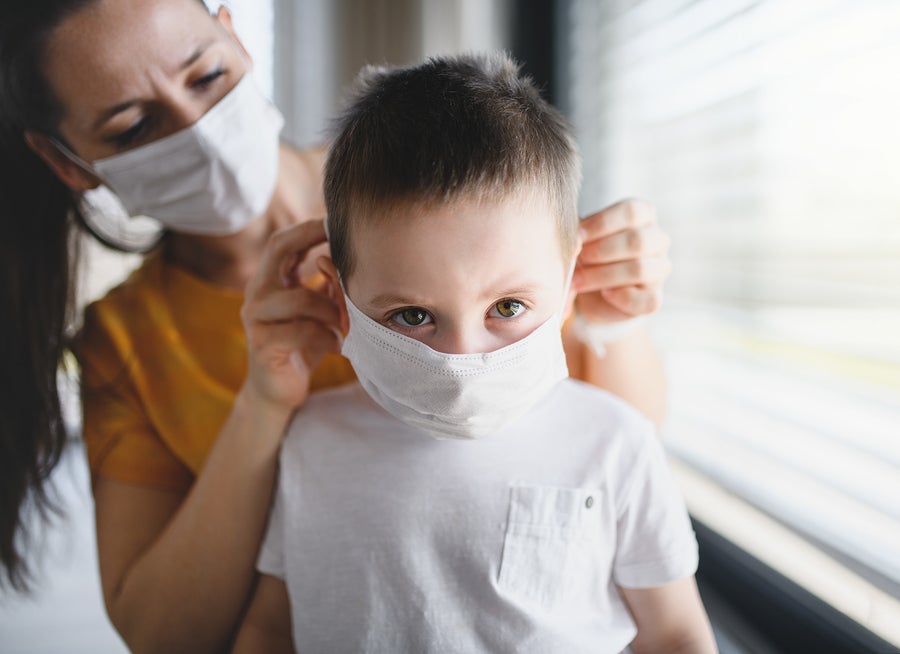The American Academy of Pediatrics (AAP) and Georgetown University Center for Children and Families (CCF) have teamed up to protect children’s health and well-being with the launch of a joint project: “Keeping Kids Connected to Care During COVID-19 and Beyond”. AAP and CCF are working with Manatt Health, Family Voices and a network of children’s advocates to educate the public, parents and policymakers about how the state and national response to the COVID-19 pandemic is impacting children. These impacts include threats to access to care, declining vaccination rates, and delayed identification and treatment for developmental and behavioral health problems that create new challenges and exacerbate preexisting health disparities. The goal of the project is to protect and improve children’s access to comprehensive care through Medicaid and the Children’s Health Insurance Program (CHIP) during and after the COVID-19 pandemic by strengthening the capacity for collaborative initiatives between state child advocates, health policy experts and AAP chapters.
Together, pediatricians, health policy experts and child health advocates can help children and families address the health challenges they face during the pandemic and beyond.
Resources
Blog Posts:
New Grant Opportunity to Boost Well-Child Visits and Immunizations in Pediatric Primary Care
White House Enlists Broad Range of Programs, Partners to Connect Youngest Children to COVID Vaccines
CMS Affirms States Must Cover Stand-Alone Vaccine Counseling under EPSDT, More Work to Be Done
Guide:
Reports:
Urgent Action Needed to Catch Up on Routine Childhood Vaccinations
Webinars:
The American Academy of Pediatrics, Family Voices, Georgetown University Center for Children and Families and Manatt Health explore how child advocates and families can work with state Medicaid agencies to enforce coverage requirements and make permanent the temporary regulatory flexibilities that have expanded access to services during the pandemic. Key topics include:
- Understanding state obligations under federal law for providing services to children during the pandemic
- Ensuring access to home healthcare services to keep children safely at home
- Addressing loss of services due to school closures
- Creating opportunities for collaboration between state agencies, providers, schools and families
- Monitoring the impact of COVID-19 on access to Medicaid services for children with special healthcare needs
Webinar: Mitigating Coverage Loss When Medicaid Continuous Coverage Requirements Expire
The American Academy of Pediatrics, Family Voices, Georgetown University Center for Children and Families and Manatt Health review the background and legal requirements associated with the Medicaid continuous coverage provisions and what needs to happen at the end of the Public Health Emergency (PHE). The speakers also delve into the strategies that can mitigate unintended coverage loss:
- Staging redeterminations to prioritize renewing coverage for children and other vulnerable populations
- Addressing high rates of returned mail due to postal delays and housing displacements caused by COVID-19 and natural disasters
- Conducting more consumer outreach and extending reply time frames
- Utilizing existing eligibility and enrollment policies to help protect children’s and families’ coverage, such as 12 months of continuous coverage
- Establishing an on-the-ground monitoring and feedback loop to assess impacts on children’s coverage and enable rapid responses
Webinar: Medicaid Managed Care Payment Policies to Support Pediatric Providers
The American Academy of Pediatrics, Georgetown University Center for Children and Families, Family Voices and Manatt Health review the legal requirements and policy considerations that govern state contracts with MCOs and what they mean for pediatric and primary care providers during COVID-19. The speakers also explore strategies states and MCOs can take to support financial stability for pediatric and other primary care providers, including:
- Directing MCO payments to network providers furnishing pediatric primary care services to make up for lost revenue resulting from the pandemic
- Creating incentives for MCOs and network providers to negotiate alternative reimbursement arrangements
- Leveraging information to assess utilization, the status of the primary care network, and MCO financial performance
Webinar: Ensuring Children’s Access to Care Through Medicaid During COVID-19
How can child advocates, providers and other stakeholders work with state Medicaid agencies to implement telehealth policies and eligibility and enrollment strategies that help ensure children have access to coverage and healthcare services during the COVID-19 crisis? Find out at a new webinar from the American Academy of Pediatrics, Family Voices, Georgetown University Center for Children and Families and Manatt Health. Key topics include:
- Rapid pediatric telehealth adoption and utilization in response to COVID-19
- Considerations for addressing inequities in access to telehealth
- Examples of the best practice state policies for promoting children’s access to telehealth, particularly for children and youth with special healthcare needs and other vulnerable populations
- Eligibility and enrollment strategies designed to address accelerated Medicaid and CHIP child enrollment during COVID-19, including:
- Maximizing awareness of coverage options;
- Using presumptive eligibility to get children into care quickly; and
- Using the Supplemental Nutrition Assistance Program (SNAP) to support enrollment.
Webinar: Preventive Medicine During a Pandemic: Ensuring Children’s Needs are Met
The American Academy of Pediatrics, Children’s Defense Fund of Ohio, Georgetown University Center for Children and Families and Ohio AAP Chapter discuss the challenges facing children, families, and their care teams, and partners in Ohio share their experiences to educate and engage the community to support children’s access to health care during the pandemic and beyond. Key topics include:
- Getting children back into the doctor and caught up with vaccines
- Strengthening systems of care
- Responding to pediatric practice disruptions
- Supporting families through education and addressing impediments to vaccinations and routine care
- Engaging community, stakeholders and policymakers in outreach and advocacy


